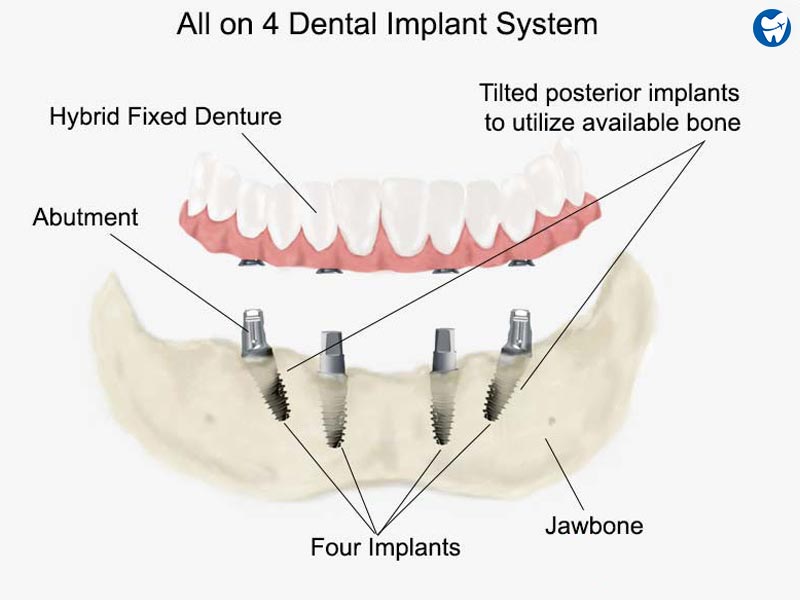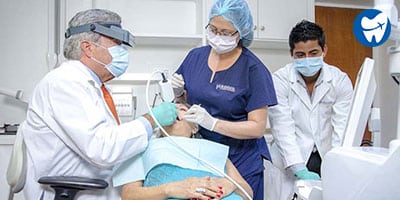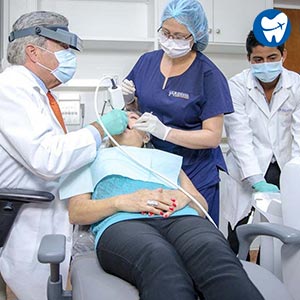Are you hiding your smile due to missing teeth? Dental implants in El Salvador can help you smile with confidence without breaking your budget.
Video Courtesy: Once in a lifetime journeys
El Salvador is identified as Central America’s hidden gem. [1] The country is considered one of the most attractive destinations for medical tourism.
Furthermore, the value for money has boosted dental tourism in El Salvador. [2]
Cost of Dental Implants in El Salvador
Americans and Canadians can save up to 70% by opting for dental implants in El Salvador.
To know how much cheaper are the dental implant procedures in El Salvador, study the cost comparison table.
Dental Work Avg. Cost Comparison (USD)
| Procedure | El Salvador | USA | Canada |
|---|---|---|---|
| Titanium Implant | $980 | $5,000 | $4,600 |
| Porcelain crown | $480 | $1,800 | $1,655 |
| Zirconium crown | $800 | $2,000 | $1,840 |
| Gold crown | $700 | $2,500 | $2,300 |
| All-on-6 | $3,500 | $28,000 | $26,000 |
| Implant denture(1 arch) | $2,200 | $6,000 | $5,500 |
| Complete denture (one jaw) | $600 | $2,000 | $1,840 |
| Simple bone grafting | $500 | $1,200 | $1,000 |
| Sinus lift (one side) | $1,200 | $2,500 | $2,000 |
The above table proves that El Salvador is a destination for cheap dental implants.
A single dental implant saves as much as 80%. Even the All-on procedure is almost 8 times cheaper than the US and Canada.
Pay 80% less for your dental implants!
Request a free quoteWhy Get Tooth Replacements in El Salvador?
DentaVacation facilitates dental tourism in El Salvador with Lorenzana Dental Center.
The benefits of getting dental implants in DentaVacation chosen clinic in El Salvador are:
Savings on High-quality Treatment
- High-quality dental implants at a fraction of the cost in the US. [4]
- Approximately 35% of Americans do not have an insurance plan. As a result, more Americans opt for dental implants in El Salvador. [5]
Short Travel
- Dental implants often require more than a single visit. Hence patients travel to nearby destinations.
- El Salvador is an ideal location for Americans looking for an easily accessible destination from the U.S. [6]
Tourism Options
- El Salvador is a beautiful tropical country with volcanic mountains, amazing beaches, and ancient Mayan sites.
- The country is a world surfing mecca for tourists. Surfing draws tourists from the US, Canada, Germany, and Brazil. [7]
Board-Certified Implantologist
- Dental professionals have degrees from some of the finest institutions in the U.S such as Baylor college, Texas.
- Many of our dentists worked at private practices in the U.S.
- Our dentists communicate efficiently in English and Spanish.
- Treatment by Board-Certified dentists (American Board of Prosthodontics and other American Board specialites).
FYI, a board-certified dental specialist needs to:
- Complete a 4-part examination.
- Undergo recertification every 8 years.
- Continuously update the skills and advancement in the specialty.
State-of-the-Art Equipment
- All dental supplies are directly sourced from the US
- Availability of high-end technology and modern equipment like
✅ The Ultrasonic bone surgery system
✅ L-PRF (Leukocyte-Platelet Rich Fibrin) technique
✅ Benexatraumatic extraction kit
✅ Dental Implant system
✅ Digital panoramic x-ray
✅ 3D CAD/CAM CEREC
✅ MOON RAY S 3D Implant surgical guides
✅ CS 8100 Compact Plug-and-Play Imaging system
- The quality of treatment follows international standards and stringent sterilization procedures. The clinic has:
✅ CE Certified Sterilizing equipment.
✅ Attest™ Biological Monitoring System.
✅ Autoclave and dry clave – that comply with international biosecurity standards by the OSHA (Occupational Safety and Health Administration).
Dental Implant Options
Dental implant procedures have increased by 6.3% during 2019-2020.
13 % of implant patients are 65 – 74 years of age. [8]
Dental implants are small screw-like metal posts that replace the root of a missing tooth.
A standard dental implant has a diameter of 1.8 mm to 7 mm. [9]
If a single tooth is missing, it can be replaced with one implant and a crown.
Benefits of a Single-tooth Implant over a Dental Bridge
1. A single-tooth implant does not affect the adjacent teeth while a bridge does. [10]
2. An implant preserves bone better than a dental bridge. [11]

Single tooth implant
- Used in partially edentulous patients
- When many teeth are missing, an implant-supported bridge or partial denture can replace them.

Full Jaw/ Full Arch Dental Implants
- Used in edentulous patients
- When all teeth in a jaw are missing, they can be replaced with any of the procedures below [12]
| Procedure | Features |
|---|---|
| Implant overdenture | |
 |
|
| Mini implant overdenture | |
 |
|
| Fixed restoration | |
 |
|
| Crown and bridge restoration | |
 |
|
Additional Procedures
These are required when the jawbone is not sufficient to support dental implants.
The procedures help to rebuild or reinforce the bone. With this new strong foundation, implant-supported teeth have a better prognosis.
Bone Grafting
Grafting increases the height, width, and thickness of the bone. [13]
The gum is lifted to expose the area of the deformed bone.
A bone or bone substitute is used to repair and build up the area.
Sinus Lift
It is a common procedure to increase bone volume in the upper jaw. [14]
It is also referred to as a bilateral lift.
The sinus floor as well as the developing bone is lifted to secure implants.

Sinus lift
Specialized Dental Implant Techniques
Depending on the jawbone health and patients’ specific needs, some alternative treatment options are performed.
Options may include:
Mini Dental Implant
The mini dental implant is a type commonly used to support a lower denture.
It is typically half of the size of a regular dental implant. It is also known as a small or narrow diameter implant.

| Pros | Cons |
|---|---|
| Survival rate of 95.6% [15] | May fracture during placement [18] |
| Less invasive procedure [16] | Can’t resist strong chewing forces [18] |
| Immediate results [16] | Not suitable for fixing dentures to the upper jaw [19] |
| Graftless procedure [16] | Not suitable for single-tooth replacement [19] |
| Fast healing [16] | Multiple MDIs needed for effective support [18] |
| Reduced risk of infection [17] | High risk of implant failure [19] |
| Cost-effective [16] | Limited evidence for long-term survival [18] |
| FDI approved [17] | Require adequate vertical bone [17] |
References – [15] , [16] , [17] , [18] , [19]
Same-Day Implants
- These are also called Immediate load implants, or teeth in a day.
- The implants and temporary teeth are fixed within 48 hours of surgery. [20]
| Pros | Cons |
|---|---|
| Instant teeth restoration [21] | High risk of implant failure [21] |
| Single surgical procedure | Require skilled & experienced surgeon [22] |
| No need to wear dentures [21] | Impaired healing can cause loosening of implant[21] |
| No need for bone grafts | Risk of infection [22] |
| Saves money & time [21] | Not possible with insufficent jawbone structure [21] |
References – [21] , [22]
All-on-4 Technique
All on Four is a unique treatment that provides a whole new set of teeth using only four implants per arch.
All on 4 is specifically designed to:
- Allow for immediate function.
- Avoid bone graft in over 95% of cases. [23]

All on Four – Success, Survival and Complication Rates
| Rate of | Upper jaw [24] | Lower jaw [25] |
|---|---|---|
| Success | 93.9% | 91.7% |
| Survival | 94.7% | 93% |
| Biological complications* | 7.8% | 11.8% |
| Mechanical complications** | 7.3% | 36.7 % |
* Soft tissue reactions, bacterial infections, etc.
** Screw loosening/fracture, cement failure, etc.
Factors to Consider for All-on-4 Implant
The general considerations are [26]
- Ability to achieve primary implant stability.
- No parafunctional habits such as bruxism, clenching.
- Indications in totally edentulous :
A. Upper jaw – Minimum bone width of 5mm and minimum bone height of 10mm from canine to canine.
B. Lower jaw – Minimum bone width of 5mm and minimum bone height of 8mm in between the mental foramina.
Benefits of All on 4
- High patient satisfaction due to immediate function and esthetics. [27]
- Beneficial for those with the thin jawbone.
- In the elderly, it can stop bone loss and preserve the jaw.
- Highly stable and efficient chewing. [28]
- Minimal discomfort and successful implant design.
- Crowns and dentures fitted on to the all-on-4 are more long-lasting. [29]
All–on-6 and All-on-8 Dental Implants
These are full-mouth reconstruction procedures performed in patients who have lost all their teeth in any jaw.
This type of restoration involves placing six or eight implants in the jawbone.

All on 6 dental implants
Dental Implant material
The most common dental implant materials are Titanium and Zirconia. Both these materials are biocompatible, and considered safe.


Titanium Dental Implant
- FDA approved [30]
- Made of pure titanium or its alloy (Aluminum, Vanadium, and Nickel)
- Two-piece implant
- Grey color
- Durable and lightweight
- High resistance to damage [31]
- Success rate of 97% and survival rate of 98.8% [32]
Read here about Titanium drawbacks, how to overcome and diagnostic test to detect titanium allergy.
Zirconia Dental Implant
- FDA approved [33]
- Also called a Ceramic implant
- Single-piece implant
- White color, non-corrosive
- Made of metal-free crystal material (Zirconium dioxide)
To know which type of dental implant material suits you, click here
There are pros and cons to each type of material. Therefore, implant type is recommended depending on the patient’s goals and concerns.
Types of Dental Implants
The dental implants can be of two types based on the location where it is fixed.
Endosteal Implants
- The implant is fixed into the jawbone [34]
- Most commonly used implant [35]
- Used as an alternative to bridges or removable dentures.
Subperiosteal Implants
- Implant rests on top of the jawbone [36]
- Do not need a healthy jawbone [37]
- Used for those who are unable to wear conventional dentures [38]
Benefits of Dental Implants
- Easy to care for [39]
- Prevents bone loss[39]
- Durable and permanent
- No embarrassing slippage
- Eat and chew with ease[39]
- Do not disturb adjacent teeth
- Decrease sensitivity in nearby teeth[39]
- Appear and behave like a natural tooth
- Prevents changes in the shape of the face
- Lowers risk of cavities in adjacent teeth[39]
- More natural and comfortable for chewing[39]
- A trusted technique with a long-term success rate of 97%[40]
References: [39] , [40]
Who Qualifies for Dental Implants?
- An ideal candidate must have
- One or more missing teeth
- Healthy gum tissues [41]
- Fully developed bone tissue, over the age of 18 [42]
- Adequate jawbone to support the implants or eligible for a bone graft
Who May not Qualify for Dental Implants?
- Young people with the jawbone in a growing stage
- Heavy smokers [43]
- Insufficient jawbone and not eligible for bone grafting [44]
- Bruxism, or teeth grinding habits [45]
- Received head or neck high-dose radiation treatment [46]
- Diabetes, connective-tissue diseases, and immune deficiencies [47]
Best Dental Clinic in El Salvador

Prostho-Implants Dental Associates
Lorenzana Dental Center in San Salvador, El Salvador offers a team of professionals who are well trained in dental implant rehabilitation.
The clinic was recently renamed “Prostho- Implants”.
It is equipped with the latest technology like digital panoramic x-ray, CT scanning equipment, 3D CAD/CAM, and CEREC.
Best Dentist in El Salvador

Expertise
Implants, All on 4/6/8, Gum SurgeryEducation
Universidad Evangélica de El SalvadorGet FREE consultation from certified dentists!
Contact us now!Conclusion
To know more about Dentistry in El Salvador, read: Dental work in El Salvador.
Low-cost dental implants are also available in Latin American countries like Costa Rica, Mexico. To know the best country for low dental implants, check low-cost dental implants abroad
DentaVacation facilitates planning your trip for dental implants in El Salvador.
FAQs Dental Implants in El Salvador
Yes, the price of a single-tooth implant in El Salvador is almost 1/5th of the US price.
Yes, dental implants are safe in El Salvador. Experienced dental surgeons, strict biosecurity measures, and state-of-the-art dental equipment provide you with safe dentistry.
- The quality of dental implants in Lorenzana Dental Center is at par with that in developed countries.
- The best materials and state-of-the-art technology along with the experience of highly-qualified professionals, ensure optimal results.
You can get as many implants as you need at Lorenzana Dental Center.
The number of implants will depend on the treatment recommended by your doctor for your specific case.
Generally, dental implants are not covered by most dental insurance plans. However, the clinic offers payment plan options.
- Send us a copy of your panoramic and RVG X-Rays, specifying the dental treatment you are looking for.
- If you want to compare your local dentist’s treatment plan with ours, you can send the plan without price. We will share ours.
- We will send a preliminary treatment plan that includes procedures, prices, and length of stay.
The minimum age to get dental implants is 18. A fully-developed jaw is required for the implants, which occur at about 18 years.
However, there is no upper age limit.
Recovery takes approximately 3 days, although it differs in some cases. During this period:
- You will need to rest and be careful with your food
- Avoid activities that disturb the area of surgical intervention.
- Take soft foods.
- Should clean your teeth with a damped gauze.
After a few days, you can return to a normal routine, but ensure not to put too much pressure on the site of surgery.
The risks of having dental implants are minimal. There should be no complications if proper care is taken. There could be issues if
- The implantologist fails to prescribe the required antibiotics
- The patient does not take prescribed antibiotics
- The patient does not have adequate oral hygiene, which could cause an infection
Yes, all-on-4 implants are designed for both effectiveness and safety. [48]
- Firstly, the implants are made out of durable titanium material. It does not react with cells and tissues.
- Secondly, the technique involves fewer implants, hence less chance of infection, discomfort, and pain.
- Thirdly, the implants are positioned in such a way that it firmly supports the prosthetic teeth.
The cost of the implant varies from each case and patient history. The following factors determine the final price of your dental implants
- Implant brand, material, and type of post, abutment, and crown
- Number of implants used
- Place where the implants are fixed in the mouth
- Type of restoration used
- The complexity of the surgery
- Need for any tooth extractions or bone grafts beforehand
- Need for additional X-rays, scans, or sedation
The time frame for fitting the implant and restoration can depend on many different factors. They are
- The rate at which the patient heals
- Condition of the jawbone
- Type of implant used
- Location and number of teeth being restored
- The technique used to place the implant(s).
After consultation and treatment planning, your dentist can give you some idea of your treatment duration.
Studies reveal that smoking increases the risk of implant failures. [49]
Hence, you may have a better outcome if you [50]
- Stop smoking one week before the implant surgery.
- Avoid smoking for at least two months after implant placement.
Here are some things to consider before and after the surgery
Before surgery
- If the procedure is done under IV sedation, food should not be consumed for 8 hours before surgery.
- If it is not done under IV sedation, you need to take antibiotics from the day before.
After surgery
- Rest the day of surgery and the day after.
- Keep talking to a minimum.
- Follow a soft-food diet to avoid wounds.
The implant itself can last a lifetime. But the implant held replacement teeth can be susceptible to trauma or gum disease.
Most importantly, the longevity of replacement teeth depends on the care. The care varies for each type of replacement teeth.
Your dental implant has every chance of lasting for many years with very good oral hygiene, regular check-ups, and avoiding smoking.
Relax on the black-sand beaches of El Salvador
Plan my trip!


